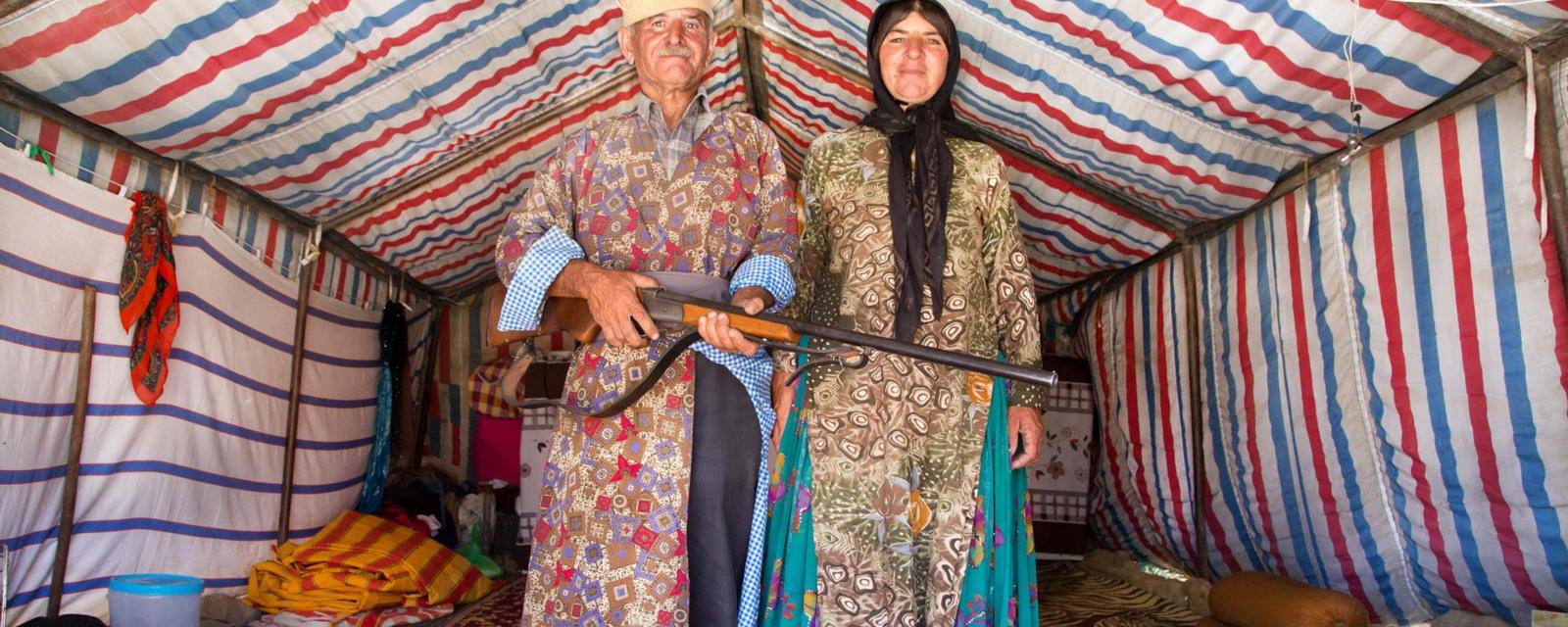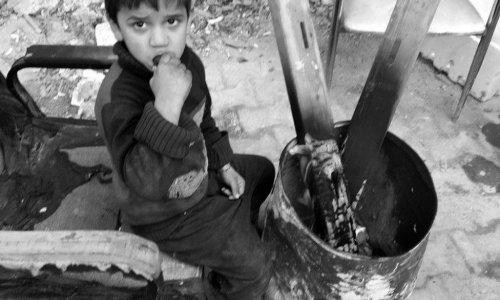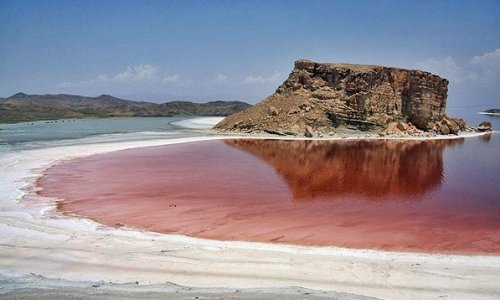Numbering just 400,000, the Qashqai are a strong and proud people who are fiercely resisting assimilation into mainstream Iranian society.
Nomads for generationsNomads for generationsIran's nomadic Qashqai, part of the Turkic peoples from Central Asia who settled in Iran during the 11th and 12th Centuries, have roamed the harsh deserts of southwest Iran for hundreds of years.
Each year, they travel with their flocks of goats and sheep from summer highland pastures north of Shiraz to winter pastures on lower (and warmer) lands near the Persian Gulf, roughly 480km to the south. Their way of life is a fine balance between man, animal and their environment.
But this traditional way of life is fast disappearing. Numbering just 400,000, many attempts have been made to try to incorporate this minority group into mainstream Iranian society. But the Qashqai have always resisted, remaining a strong, proud and independent people. (Credit: Pascal Mannaerts)
Under the tent, under the starsGhazal and his wife Tarkkenaz live for about half the year near Koohmare Sorkhi, a village approximately 50km from Shiraz, moving 200km north near the city of Kazerun when the weather gets cooler. Like many Qashqai, they refuse to abandon their traditional lifestyle and continue to live the way their ancestors have for centuries.
Now retired, Ghazal was a Farsi teacher for nomadic children for 30 years. He believes this work is vital as it allows the Qashqai to preserve their independence and culture. But it's become increasingly hard to find teachers who will travel with the children. Few nomadic people are qualified, and those from the cities and villages and are not used to the lifestyle. As the tribe runs out of teachers, either the children don't attend school or, if their parents can afford it, are sent to schools in town, where they usually choose to stay afterwards. (Credit: Pascal Mannaerts)
The elders, seals of traditionAssimilation politics over the past few decades have pushed a lot of Qashqai to settle in cities or villages, while growing urban centres are encroaching on their grazing lands. But their nomadic lifestyle has created a strong cohesion and solidarity within Qashqai families and their extended community.
Ghazal's aunt, Madina, lost her husband a few years ago and her family has supported her since his death. She now travels with them across the country and finds it inconceivable to abandon the nomadic way of life.
"I was born a nomad, this is how I later raised my children. We have always lived this way, and although our life can be considered as very basic by others, this is the way we want to remain. I have never lived in a city and I would never move there. My soul is here". (Credit: Pascal Mannaerts)
Man and animalThe Qashqai could not imagine a life without their herds, which are fundamental for their survival. They use the goats to provide milk, cheese and meat for their daily needs, but also sell the babies at the market of Shiraz for money to buy any necessary goods.
The increasing difficulties the Qashqai face to graze their flocks seriously jeopardizes their freedom and independence. More and more Qashqai are then tempted to quit farming and head to the city to make a living.
In the photo above, a new member of the herd is born. (Credit: Pascal Mannaerts)
Famous handicraftsFor centuries, the Qashqai have been renowned across Iran for their pile carpets and other wool products, often referred to as "Shiraz" as this is their major marketplace. The wool produced in the mountains and valleys near Shiraz is exceptionally soft and beautiful and takes a deeper colour than wool from other parts of Iran. Today, Tarkkenaz and other women in her family still produce these traditional wool products, with traders coming regularly to camp to buy them. (Credit: Pascal Mannaerts)Generational conflictsThe Qashqai youth often feel pinched between their desire for modernity and a sense of family loyalty. Mohammed Reza (pictured on the left, with friends), the youngest son of Ghazal and Tarkkenaz, is about to complete his mandatory two years of military service. He wants to study mechanics and open a garage in Koohmare Sorkhi afterwards. His older brother, Ali Reza, moved to town five years ago to open a grocery store, leaving his parents with their herds. The family is gradually scattering and Ghazal and Tarkkenaz have difficulties finding people to care for the flock. They receive some help from Ghazal's brother to help pay for the daily work that would otherwise have been done by their own children. (Credit: Pascal Mannaerts)
A different worldWhen I was staying with Ghazal and Tarkkenaz, a Qashqai wedding was taking place in Koohmare Sorkhi. The groom invited me into the tent and allowed me to take a picture of the couple, an incredibly special moment as the he told me that this was the first time he'd spoken to a foreigner. (Credit: Pascal Mannaerts)
Dancing and livingThe Qashqai have always claimed a very specific identity, and their traditions are markedly different than those of mainstream Iranian society. Although they follow Muslim wedding traditions, these celebrations are also an opportunity to perpetuate their cultural heritage through dances, parades, battle shows and traditional dress. They are also occasions for Qashqai nomads to come together, as they often live far from each other in very remote areas. (Credit: Pascal Mannaerts)
Set apartDespite officially being Muslim, like the rest of Iran, the Qashqai have little contact with Islamic institutions. They follow Muslim traditions during the rites of marriage and death, but very few observe daily prayers and they do not fast during Ramadan. Their nomadic lifestyle has allowed them to preserve this independence over the centuries.
Pictured here Azal, Ghazal’s brother, proudly poses in a traditional Qashqai hat. (Credit: Pascal Mannaerts)
Firmness for the futureQashqai nomads are proud of their cultural heritage and traditions – but it’s unclear whether this will be sufficient to convince the younger generations to keep the traditional lifestyle of their parents. Ghazal (pictured) wants to remain nomadic at costs.
"I could never live in a house with walls and a ceiling. I would just suffocate and wonder every day what I am doing and why I should stay there. I would feel like I am prisoner or like I have betrayed my ancestors. We are Qashqai, we are different,” he said. (Credit: Pascal Mannaerts)
(BBC)






www.ann.az
Follow us !











